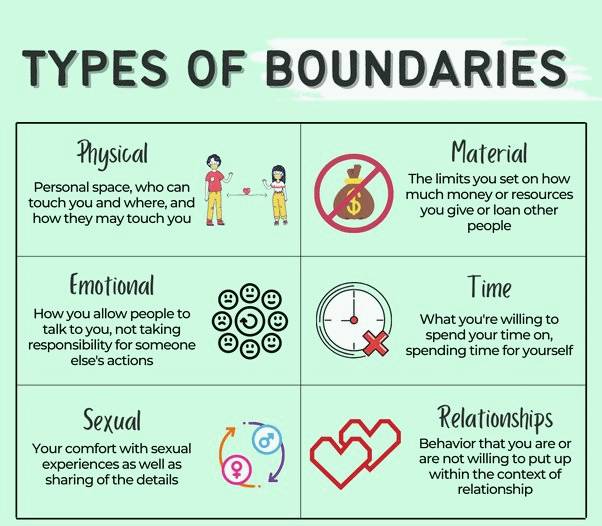Setting boundaries is essential for emotional well-being, yet many struggle with guilt when asserting personal limits. The brain’s response to boundary-setting, combined with social conditioning, often makes people feel uncomfortable saying no. However, understanding the science behind these feelings can help individuals set limits confidently. By practicing effective strategies, people can maintain healthy relationships without compromising their own needs.

The Psychological Need for Personal Space
Boundaries are essential for mental and emotional well-being. They serve as invisible lines that define personal comfort zones, ensuring that interactions remain respectful and balanced. Without boundaries, people often feel overwhelmed, taken advantage of, or emotionally drained.
Personal space is more than just a physical concept. It extends to emotional, mental, and even digital spaces. When individuals lack control over their personal space, they may experience heightened stress and anxiety. Research shows that those who set clear boundaries enjoy better self-esteem and emotional resilience. Boundaries allow people to prioritize self-care while still maintaining healthy relationships.
When boundaries are weak, individuals may feel pressured to meet others’ demands at the cost of their own needs. Over time, this leads to exhaustion and resentment. Setting firm yet flexible limits creates a sense of control and empowerment. It helps people protect their mental health while fostering positive relationships.
Establishing personal space also improves decision-making abilities. When individuals have clear boundaries, they can think more rationally without external pressures clouding their judgment. This results in better problem-solving skills and an overall sense of emotional stability.
Another important aspect of personal space is its role in emotional regulation. When someone constantly feels invaded or overwhelmed, their stress levels increase. Studies indicate that maintaining personal space reduces cortisol, the stress hormone. Lower cortisol levels contribute to better emotional health and increased overall happiness.
Maintaining personal space is not about isolation. Instead, it allows people to recharge and interact with others more meaningfully. By respecting individual limits, relationships become healthier, stronger, and more fulfilling.
The Role of Personal Space in Different Relationships
Boundaries play a crucial role in various relationships. In friendships, they ensure mutual respect and prevent emotional exhaustion. Friends who understand and respect boundaries tend to have longer-lasting and more fulfilling connections.
In romantic relationships, personal space helps maintain individuality. While closeness is important, maintaining a sense of self prevents dependency and encourages personal growth. Partners who set boundaries communicate more effectively and experience fewer conflicts.
Workplace boundaries are equally important. Without them, employees may feel overwhelmed and unproductive. Setting clear work-life boundaries enhances job satisfaction and prevents burnout. Respecting personal limits in a professional setting also fosters better teamwork and collaboration.
Emotional Impact of Weak Boundaries
Increased Stress and Anxiety
Individuals who struggle to set boundaries frequently experience burnout, anxiety, and frustration. When personal limits are not clearly established, it becomes difficult to manage time, energy, and relationships effectively. Without boundaries, people often feel responsible for others’ emotions, leading to constant stress.
Studies suggest that individuals with poor boundaries are more prone to chronic stress. Their inability to say no results in overcommitment, leaving them feeling exhausted. Over time, this stress manifests as anxiety, irritability, and emotional fatigue.
The brain’s response to constant stress affects both mental and physical health. High stress levels weaken the immune system, making individuals more susceptible to illnesses. Additionally, prolonged stress negatively impacts memory, concentration, and overall cognitive function.
Burnout and Emotional Exhaustion
Burnout occurs when individuals consistently push themselves beyond their limits. It is common among those who struggle to set boundaries. The inability to say no often leads to overworking and emotional depletion.
Burnout affects various aspects of life. It reduces productivity, lowers motivation, and increases feelings of hopelessness. Individuals experiencing burnout may also struggle with sleep disturbances, lack of focus, and irritability.
Recovering from burnout requires conscious effort. Setting firm boundaries, taking breaks, and prioritizing self-care help in restoring emotional balance. Without proper boundaries, burnout can become a recurring cycle that negatively impacts both personal and professional life.
Impact on Self-Esteem and Relationships
Weak boundaries often lead to feelings of resentment and frustration. When people constantly put others’ needs before their own, they may feel unappreciated or undervalued. Over time, this damages self-esteem and creates unhealthy relationship dynamics.
Healthy relationships require mutual respect. When one person repeatedly compromises their boundaries, it leads to imbalance and dissatisfaction. In friendships, weak boundaries may result in one-sided relationships where one person feels drained.
In romantic relationships, lack of boundaries can lead to codependency. One partner may feel suffocated, while the other may feel neglected. Establishing clear expectations and limits fosters a more balanced and fulfilling connection.
The Connection Between Weak Boundaries and Guilt
Many individuals struggle to set boundaries due to guilt. They fear disappointing others or being perceived as selfish. However, prioritizing personal needs is not selfish—it is necessary for well-being.
Guilt often stems from societal conditioning. From a young age, people are taught to prioritize others over themselves. This belief makes boundary-setting feel uncomfortable. However, overcoming this guilt is essential for maintaining emotional health.
Practicing self-compassion helps in reducing guilt. Reminding oneself that setting boundaries is an act of self-respect makes the process easier. The more individuals practice boundary-setting, the less guilt they experience.
How to Strengthen Emotional Boundaries
Strengthening boundaries requires self-awareness and practice. Identifying areas where boundaries are weak is the first step. Once recognized, individuals can work on setting and reinforcing their limits.
Assertive communication is key. Expressing needs clearly and confidently ensures that boundaries are respected. Using “I” statements, such as “I need some time for myself,” helps in conveying personal limits without sounding confrontational.
Practicing self-care also reinforces boundaries. Prioritizing rest, hobbies, and personal interests strengthens emotional resilience. When individuals take care of themselves, they are better equipped to handle challenges.
Surrounding oneself with supportive individuals makes boundary-setting easier. People who respect boundaries encourage personal growth and emotional well-being. On the other hand, those who consistently violate boundaries may need to be reassessed in one’s life.
The Science Behind Boundaries and Guilt
Setting boundaries is essential for emotional well-being, yet many people struggle with it due to guilt and social conditioning. Understanding the brain’s response to boundary-setting and the learned behaviors that contribute to guilt can help individuals develop healthier relationships. By exploring neuroscience and practical strategies, people can set and maintain boundaries confidently without fear or guilt.
The Brain’s Response to Boundary Setting
Neuroscience and Emotional Regulation
Neuroscience reveals that setting boundaries activates the prefrontal cortex, the area responsible for decision-making and emotional regulation. This part of the brain helps individuals assess situations logically and determine what is best for their well-being. When someone asserts a boundary, their prefrontal cortex engages to reinforce the decision with rational thinking.
However, the amygdala, which processes emotions like fear and guilt, can trigger discomfort when setting limits. This response stems from evolutionary survival mechanisms. Humans are wired for social belonging, so any action that may lead to conflict or rejection can feel threatening. The brain perceives potential disconnection as a risk, even when asserting boundaries is necessary for mental health.
Over time, repeated practice helps rewire the brain. When individuals consistently set boundaries, their prefrontal cortex strengthens its role in decision-making. As a result, the discomfort from the amygdala decreases, making it easier to assert personal limits.
The Role of Cortisol and Stress
When boundaries are weak, stress levels tend to rise. The body releases cortisol, the stress hormone, when individuals feel overwhelmed or pressured. Chronic exposure to high cortisol levels leads to anxiety, fatigue, and emotional exhaustion. By establishing clear boundaries, people reduce stress triggers and create a sense of emotional security.
Research indicates that individuals with firm boundaries experience lower stress and better emotional regulation. Their ability to say no protects them from overcommitment and burnout. Additionally, strong boundaries enhance self-confidence, allowing people to navigate social interactions with ease.
Social Conditioning and Guilt
Why Guilt Arises When Setting Boundaries
From a young age, many people are conditioned to prioritize others’ needs over their own. Parents, teachers, and society often reward self-sacrifice while discouraging assertiveness. As a result, individuals learn to associate boundary-setting with selfishness or guilt.
This learned behavior makes it difficult to say no, even when it is necessary. People may fear disappointing others or worry about being perceived as rude. However, prioritizing personal well-being does not mean disregarding others. It simply ensures that interactions remain respectful and mutually beneficial.
Breaking Free from Learned Guilt
Recognizing this conditioning is the first step in overcoming unnecessary guilt. Awareness allows individuals to challenge ingrained beliefs and replace them with healthier perspectives. Instead of viewing boundary-setting as selfish, people can see it as an act of self-respect.
One effective way to break free from guilt is by practicing self-compassion. Reminding oneself that personal needs matter can help reduce feelings of obligation. Over time, repeated boundary-setting strengthens emotional resilience and reduces guilt’s influence.
Strategies for Setting Boundaries Confidently
Identifying Personal Limits
Understanding where to draw the line requires self-awareness. Reflecting on moments of stress or discomfort helps individuals identify areas where boundaries need reinforcement. Common boundary issues arise in personal relationships, workplaces, and digital spaces.
Journaling or self-reflection exercises can help recognize patterns. For instance, if certain interactions consistently leave a person feeling drained, it may indicate a need for stronger boundaries. Identifying personal triggers allows individuals to create specific strategies for maintaining balance.
Communicating Boundaries Effectively
Clear and respectful communication is key to boundary-setting. Using “I” statements, such as “I need some time to recharge,” helps express needs without sounding accusatory. This approach focuses on personal well-being rather than blaming others.
When communicating boundaries, it is essential to remain calm and assertive. Being direct yet respectful ensures that others understand the message without feeling attacked. Setting expectations early in relationships also helps prevent boundary violations before they occur.
The Power of Nonverbal Communication
Body language plays a crucial role in reinforcing boundaries. Maintaining eye contact, using a firm yet calm tone, and adopting an assertive posture enhance credibility. These nonverbal cues signal confidence and make itty clear that the boundary is firm.
Nonverbal reinforcement is especially important in workplace settings. A strong, professional demeanor helps establish authority while maintaining respectful interactions. By aligning body language with verbal communication, individuals reinforce their boundaries more effectively.
Overcoming Fear of Rejection
Fear of conflict or rejection often prevents individuals from asserting boundaries. However, research suggests that setting clear limits strengthens relationships rather than harming them. People tend to respect those who communicate their needs transparently.
Understanding that boundaries filter out unhealthy relationships can also be empowering. Those who do not respect limits may not have an individual’s best interests at heart. By prioritizing self-respect, individuals attract healthier, more supportive connections.

Practical Techniques to Maintain Boundaries
Establishing Digital Boundaries
In an age of constant connectivity, setting boundaries in digital spaces is essential. Turning off notifications during personal time and limiting access to work emails outside business hours significantly reduces stress.
Social media boundaries also play a role in mental health. Unfollowing or muting accounts that cause negativity helps maintain emotional balance. Additionally, setting time limits for screen use prevents digital burnout.
Handling Pushback Gracefully
Not everyone will respond positively to new boundaries. Some may challenge limits, especially if they are accustomed to unrestricted access. When faced with resistance, remaining firm yet empathetic is crucial.
Acknowledging others’ feelings while reiterating personal needs can help ease tension. For example, saying, “I understand that this change may be difficult, but I need to prioritize my well-being,” communicates both empathy and firmness.
The Role of Self-Compassion
Practicing self-compassion helps in managing guilt. Reminding oneself that prioritizing well-being is not selfish but necessary for long-term happiness and productivity reinforces boundary-setting.
Engaging in self-care activities further supports emotional resilience. Whether through mindfulness, hobbies, or therapy, self-care practices strengthen confidence in personal choices. The more individuals prioritize their needs, the easier it becomes to maintain boundaries.
The Long-Term Benefits of Healthy Boundaries
Increased Self-Respect and Confidence
Setting and maintaining boundaries fosters self-respect. When individuals assert their needs, they build confidence and gain greater control over their lives. Each successful boundary-setting experience reinforces self-worth.
Confidence in boundary-setting also improves decision-making. People who trust their limits make choices that align with their values. This alignment creates a sense of purpose and fulfillment.
Strengthened Relationships
Healthy boundaries improve relationships by fostering mutual respect. Clear expectations prevent misunderstandings and create a balanced dynamic. When individuals communicate their limits, they attract connections that honor their well-being.
Boundaries also enhance emotional intimacy. When both parties understand and respect each other’s needs, trust deepens. Strong relationships are built on respect, and boundaries play a crucial role in maintaining that foundation.
Daring to set boundaries is about having the courage to love ourselves, even when we risk disappointing others
Brené Brown
Final Thoughts on Boundary Setting
Setting boundaries is a continuous process that requires practice and patience. By understanding the psychological mechanisms behind guilt and implementing practical strategies, individuals can maintain healthy relationships without compromising their well-being.
Prioritizing personal needs ultimately leads to a more fulfilling and balanced life. The more individuals practice setting boundaries, the more natural it becomes. Over time, the discomfort fades, and self-respect grows. Healthy boundaries empower people to lead happier, more confident lives.
